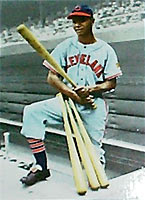With Thursday marking the 60th Anniversary of Larry Doby’s first appearance as a Cleveland Indian, I asked a longtime reader, who is an avid Larry Doby memorabilia collector and possibly one of the greatest fans of the influential trailblazer anywhere, for a reflection on Larry Doby, his impact on Indians’ history, his role in the integration of baseball and his thoughts as we reach the anniversary of a brave act by Larry Doby.
It’s 1952, the voice of Jimmy Dudley (WERE) is heard in the background of the goings-on of daily life-- at home, at the barbershop, or at the corner mom and pop grocery store. “Hello Baseball Fans Everywhere….” There is no SportsCenter, no Baseball Tonight, nor ESPN for that matter. Local broadcast TV is in its infancy; Cleveland’s WXEL-TV’s rare coverage is seen by only a few who own televisions.
Your neighbor, Mr. Preston sees you outside in your gray-flannel Cleveland Indians uniform and asks you who you are. You respond, “Larry Doby.” You’re four years old and the name Larry Doby resonates in your ear much like the kids today hear Grady Sizemore or Travis Hafner.
Larry Doby’s among the league leaders in runs, home runs, and slugging percentage. As a four year old you are immune to the adult world of racism. You have no understanding of what Larry Doby has endured off the field over the past five years. On July 5, 1947, Larry broke the color barrier in the American League eleven weeks after Jackie Robinson became the first African-American to play major league baseball. In your lifetime, Larry Doby has played in one World Series and four all-star games.
He’s your hero.
The color of a man’s skin doesn’t matter to a four-year old.
It’s fifty-five years later, and my interest in Larry Doby has not waned. I admire his success on the field and the character he showed off the field. My respect for him continues to grow. Unlike Jackie Robinson who had the opportunity to prepare by playing minor league ball with the Brooklyn Dodgers AAA club in Montreal the previous year, Larry Doby came to Cleveland directly from the Negro League’s Newark Eagles. Racism and bigotry did not end with Robinson’s entry. Doby faced years of prejudice throughout his career. Acceptance by his own teammates was not a given. He was often excluded from team functions and dinners. In 13 spring trainings, he was only allowed to stay in the same hotel as his teammates in three of those seasons. The spring of 1960, with the White Sox, was his last.
Larry Doby paid a great personal price for crossing the color barrier, but his athletic ability earned for him a series of firsts—1st African-American to hit a homerun in a World Series (1948), 1st African-American to play for a World Series Champion (1948), and 1st African-American to win a homerun title (1952). His induction into the Baseball Hall of Fame in 1998 brought him the highest level of recognition for his contributions to the game of baseball.
Part of the enjoyment of being an Indians fan is dreaming, wishing, and “what if-ing.”
As a Doby memorabilia collector, I end this remembrance with my favorite story about Larry Doby:
From 1947 through 1958, only two different teams won the American League pennant, the Yankees and the Indians. The Indians won in 1948 and 1954.
How different Major League history might have been had Indians G.M. Hank Greenberg listened to Larry Doby. In 1949, Doby suggested the Indians take a look at three players he played against in the Negro Leagues-- Hank Aaron, of the Indianapolis Clowns, Ernie Banks, of the Kansas City Monarchs and Willie Mays, of the Birmingham Black Barons.
The scouting reports were not good. Greenberg reported to Doby, “Aaron has a hitch in his swing and will never hit good pitching. Banks is too slow and didn’t have enough range, and Mays can’t hit a curveball.”
Hmm, how different the 50s and 60s might have been for this four-year old and all of baseball?
For more in-depth information about Larry Doby see the following websites:
Larry Doby's Hall of Fame Biography
Sights and Sounds of Larry Doby
Larry Doby Chronology
A big thank you to our writer, who (not surprisingly) goes by the handle doby14 in the forum, and I hope that this monumental anniversary opens some eyes to the tremendous career of Doby and the important role that Doby played in the integration of MLB, one not too far off of the role that Jackie Robinson played, but with considerable less fanfare and acclaim.





